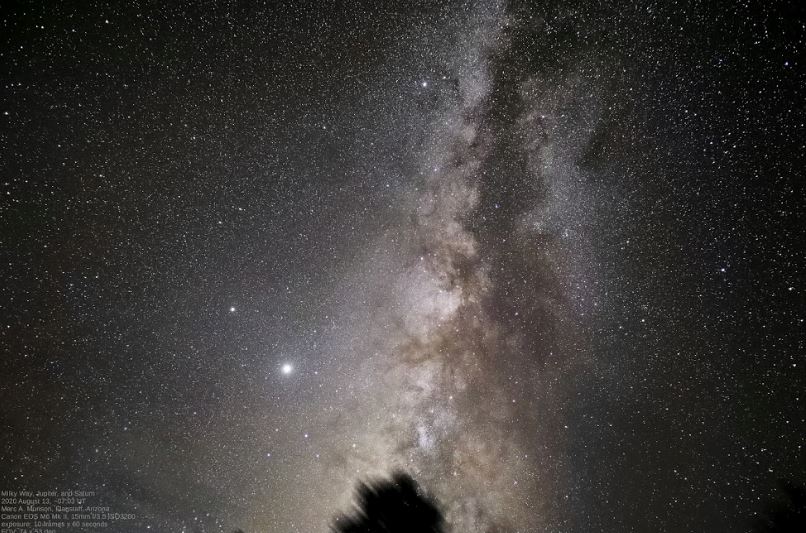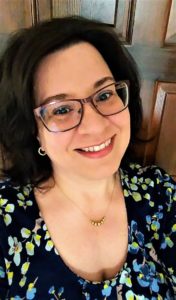
I always thought I was going to be an astronomer. But failing physics and trigonometry in high school put me on a different path. It’s good I found an astronomer to marry, I thought again as I packed our car with chairs and blankets. It was the second night of the Perseid meteor shower, and Marc knew a perfect place to observe the meteors. Although the lights of downtown Flagstaff continue to encroach on our Dark Sky city, there are still a few places around town where it’s easy to see a bright Milky Way on a clear night.
Over the years, I’ve learned that if I see three good meteors during one of the annual showers then I’ve been lucky. I’m in it for all of the other sky spectacles as well. I love identifying constellations and planets. This night I knew the positions of Saturn and Jupiter and, later, Marc showed me Mars rising. I remember what the planets look like, holding in my mind the striations of Jupiter’s atmosphere and the red stormy spot. For Saturn, I imagine every icy ring etched in my mind from the first photographs from Voyager. But what I actually see are two bright star-like objects with no distinguishing features. I only know what they look like from images and know where they are because of their relation to other objects. They seem to cruise at their own speeds heading toward the vapor-like strip of the Milky Way overhead.
I ask Marc to take a photo of the planets, and he obliges me. Looking over his shoulder, I am astonished by what I see on the viewscreen: clear clusters of stars, billions more than Carl Sagan could have helped me imagine, and the Milky Way split, seemingly broken, stretched across the dome of the sky like a clouded rainbow. When I ask Marc about all of the stars revealed through the camera’s image, he explains the differences between our eye and the camera’s sensor and lenses. I find myself lost in the explanation and stare into the dark, mutely imagining what else is there that I can’t see.
Driving home, I realize that this is how I lived my pre-pandemic life: captivated and distracted by the biggest, brightest objects in front of me. Meanwhile, billions of unseen and unconsidered particles hovered all around, occasionally presenting themselves in my peripheral vision. At the beginning of the pandemic, every challenge shone with the same intensity: how to move classes online, where to find disinfectant wipes, how to take care of friends and family and how to get more sleep. Eventually, each object dulled to become part of this constellation of daily life.
Then, a new bright object appeared: the loss of my teaching position. A different set of problems clustered around this one. I worried about finding another teaching position. More broadly, I worried who I was if I was no longer teaching. Others who wanted to help suggested I reinvent myself—again. Apparently, I had made it look too easy the first time around. This was not the answer. I wanted to keep exploring the particular cosmos of teaching. Thankfully, my friend and mentor helped me find another teaching situation, and it’s working out well. I thought because of this that I was OK. But I wasn’t, or at least not all the way.
Last week, I was caught unawares. Like the flash of a meteor in my peripheral vision, a line from a newspaper article about my former employer wedged itself in my brain: “[…] administrators said Monday they are still working to compile an accurate list of the total number of non-tenure track faculty no longer on payroll as a result of this restructuring.”
In the constellation of seen and unseen teachers who could be counted as human beings, I (and we all) had passed into the ether, no longer countable. Even the smallest known star in the universe has a name and can be cataloged: EBLM J0555-57Ab. . Although we can’t visit it, scientists still know its size, mass, brightness and position in our galaxy. I was flummoxed. Objects billions of light years away can be categorized and counted, but at the university less than three miles from my home, people can’t be? This incongruity made me feel worthless indeed. I spent the day in a downward spiral, repeating the newspaper quote to myself, while bumping into the sofa and dining room table, discombobulated and untethered. Who was I uncounted and without my name? This article enhanced my belief that the university functioned like a black hole, sucking me in to its undifferentiated miasma where administrators could not even bother to count me or hear my heart break.
A solid night’s sleep (and, let’s be honest, an evening tonic) helped me see that my universe analogy was incorrect. It had been formed through my previously limited vision, without the benefit of a quality camera lens. Now that I can see the whole night sky, this black hole metaphor has lost its hold on me, as has the place. Instead, I see the place for what it is: a free-floating planet, untethered from a solar system, separated from the community of other planets and stars. This little planet is hurtling toward a black hole. I hope it uses the forces of gravity (and its own previous goodness) to slingshot its way back into our orbit. However, right now, we are no longer on the same journey. I belong to another solar system entirely. Whether someone else knows how to count me, I choose to stand in my own light, seen or not. I don’t need a special lens to know all the other stars that surround me, unafraid to shine, each of us occupying our own spaces, together.

